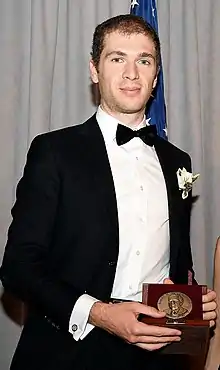John Pardon
John Vincent Pardon (born June 1989) is an American mathematician who works on geometry and topology.[1] He is primarily known for having solved Gromov's problem on distortion of knots, for which he was awarded the 2012 Morgan Prize. He is currently a full professor of mathematics at Princeton University.
John V. Pardon | |
|---|---|
 Pardon receiving the 2017 Alan T. Waterman Award | |
| Born | June 1989 (age 31) |
| Nationality | American |
| Alma mater | Stanford University Princeton University |
| Known for | Gromov's problem on distortion of knots Proof of the 3 dimensional case of Hilbert–Smith conjecture |
| Awards | Morgan Prize (2012) Alan T. Waterman Award (2017) |
| Scientific career | |
| Fields | Mathematics |
| Institutions | Princeton University |
| Doctoral advisor | Yakov Eliashberg |
Education and accomplishments
Pardon's father, William Pardon, is a mathematics professor at Duke University, and when Pardon was a high school student at the Durham Academy he also took classes at Duke.[2] He was a three-time gold medalist at the International Olympiad in Informatics, in 2005, 2006, and 2007.[3] In 2007, Pardon placed second in the Intel Science Talent Search competition, with a generalization to rectifiable curves of the carpenter's rule problem for polygons. In this project, he showed that every rectifiable Jordan curve in the plane can be continuously deformed into a convex curve without changing its length and without ever allowing any two points of the curve to get closer to each other.[4] He published this research in the Transactions of the American Mathematical Society in 2009.
Pardon then went to Princeton University, where after his sophomore year he primarily took graduate-level mathematics classes.[2] At Princeton, Pardon solved a problem in knot theory posed by Mikhail Gromov in 1983 about whether every knot can be embedded into three-dimensional space with bounded stretch factor. Pardon showed that, on the contrary, the stretch factor of certain torus knots could be arbitrarily large. His proof was published in the Annals of Mathematics in 2011, and earned him the Morgan Prize of 2012.[2][5][6] Pardon also took part in a Chinese-language immersion program at Princeton, and was part of Princeton's team at an international debate competition in Singapore, broadcast on Chinese television. As a cello player he was a two-time winner of the Princeton Sinfonia concerto competition. He graduated in 2011, as Princeton's valedictorian.[2]
He went to Stanford University for his graduate studies, where his accomplishments included solving the three-dimensional case of the Hilbert–Smith conjecture. He completed his Ph.D. in 2015, under the supervision of Yakov Eliashberg,[7] and continued at Stanford as an assistant professor. In 2015, he was also appointed to a five-year term as a Clay Research Fellow.[8]
Since fall 2016, he has been a full professor of mathematics at Princeton University.[9]
Awards and honors
In 2017, Pardon received National Science Foundation Alan T. Waterman Award for his contributions to geometry and topology.[10]
He was elected to the 2018 class of fellows of the American Mathematical Society.[11] Also in 2018 he was an invited speaker at the International Congress of Mathematicians in Rio de Janeiro.
Selected publications
- Pardon, John (2009), "On the unfolding of simple closed curves" (PDF), Transactions of the American Mathematical Society, 361 (4): 1749–1764, arXiv:0809.1404, doi:10.1090/S0002-9947-08-04781-8, MR 2465815, S2CID 230031.
- Pardon, John (2011), "On the distortion of knots on embedded surfaces" (PDF), Annals of Mathematics, Second Series, 174 (1): 637–646, arXiv:1010.1972, doi:10.4007/annals.2011.174.1.21, MR 2811613, S2CID 55567836.
- Pardon, John (2011), "Central limit theorems for random polygons in an arbitrary convex set", Annals of Probability, 39 (3): 881–903, doi:10.1214/10-AOP568, MR 2789578.
- Pardon, John (2013), "The Hilbert–Smith conjecture for three-manifolds" (PDF), Journal of the American Mathematical Society, 26 (3): 879–899, arXiv:1112.2324, doi:10.1090/S0894-0347-2013-00766-3, MR 3037790, S2CID 96422853.
- Pardon, John (2016). "An algebraic approach to virtual fundamental cycles on moduli spaces of pseudo-holomorphic curves". Geometry & Topology. 20 (2): 779–1034. arXiv:1309.2370. doi:10.2140/gt.2016.20.779. MR 3493097. S2CID 119171219.
- Pardon, John (2019). "Contact homology and virtual fundamental cycles". Journal of the American Mathematical Society. 32 (3): 825–919. arXiv:1508.03873. doi:10.1090/jams/924. MR 3981989. S2CID 119335098.
References
- Clay Mathematics Institute > People
- Quiñones, Eric (May 23, 2011), "Pardon breaks new ground on path to becoming valedictorian", News at Princeton, Princeton University, retrieved 2015-11-26.
- "Hall of Fame", International Olympiad in Informatics, retrieved 2015-11-26.
- Aimee Cunningham, "The Next Generation", Science News, 17 March 2007, p. 166.
- Clay Mathematics Institute, "Research Fellow: John Pardon" (28 January 2015)
- Kehoe, Elaine (April 2012), "2012 Morgan Prize" (PDF), Notices of the American Mathematical Society, 59 (4): 569–571.
- John Pardon at the Mathematics Genealogy Project
- Research Fellow: John Pardon, Clay Mathematics Institute, January 28, 2015, retrieved 2015-11-27.
- https://www.princeton.edu/main/news/archive/S46/12/66C86/index.xml?section=topstories
- http://www.math.princeton.edu/news/home-page/professor-john-pardon-11-receives-nsf-waterman-award
- 2018 Class of the Fellows of the AMS, American Mathematical Society, retrieved 2017-11-03
External links
- Home page of John Pardon at Princeton, with 11 papers (as of October 2016)
- 21 Questions With … John Pardon ’11, University Press Club, Princeton